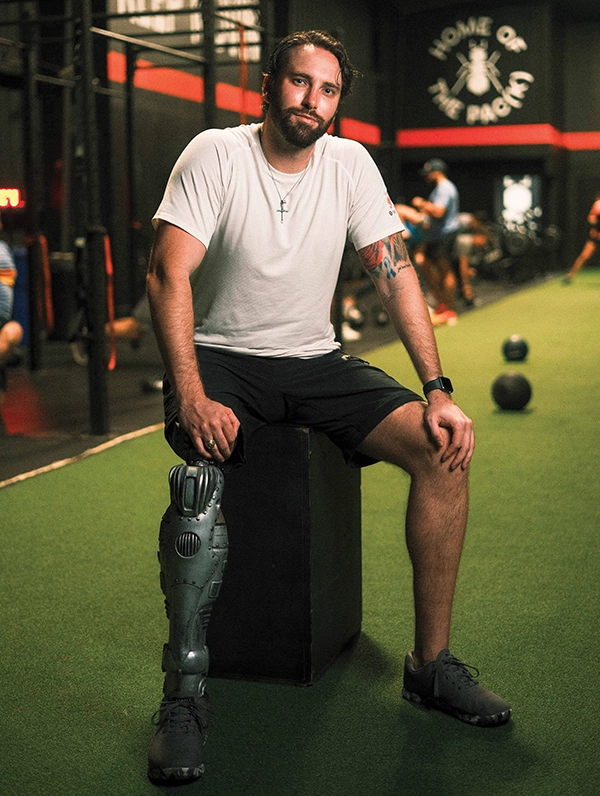by Cam Ayala • Images Patrick Pressgrove
How many times have you heard the old phrase, “In order to love somebody else, you first have to love yourself?”
It’s a cliché, but that’s not necessarily a bad thing. I belong to a generation that recognizes the necessity for self-care and self-love. But like most things in life, loving yourself is much easier said than done—especially when you are a person with a chronic disease, limb loss/limb difference, or another disability. We are often our own toughest critics, and society’s expectations can seem like an impossible target to hit.
I learned that lesson before I became an amputee when I appeared as a contestant in Season 15 of The Bachelorette in 2019. In one episode, I opened up about my lifelong health journey with lymphedema, a congenital disease that causes painful swelling and infections in the limbs. My story was manipulated against me, leading me to not only be eliminated from the show but, even worse, to be perceived as a villain by millions of strangers. People magazine even put me on a list of the most notorious villains in the show’s history.
It was one of the most difficult things I’ve ever experienced. I felt incredibly depressed and alone. When I finally decided to have my leg amputated in 2022, it felt easy by comparison. I literally thought, “I have nothing to lose besides a leg,” and that seemed relatively minimal in the grand scheme of my diminishing happiness.
Since becoming an amputee, I’ve done a much better job of loving all of me. I didn’t expect that—not after failing at love in front of a national TV audience and getting a crash course in public humiliation. My story is proof that we can all learn how to accept, love, and honor ourselves, and to receive love from people who accept and honor all of us.
Here’s how it happened for me.
THINKING BACK ON MY CHILDHOOD, it’s hard to pinpoint exactly how I became such a hopeless romantic. I grew up before social media was invented, so I formed my impression of what “real love” should be from rom-com films and pop songs. Another factor is that I was raised in the South, which reinforced very traditional gender roles. The man is supposed to be the protector, provider, and head of the household. That is a lot of pressure to put on any individual, regardless of their gender identity. And because I was born with a disability, I often felt like a burden to the loved ones around me—and I wondered how I would live up to cultural norms. This is where my insecurities took root.
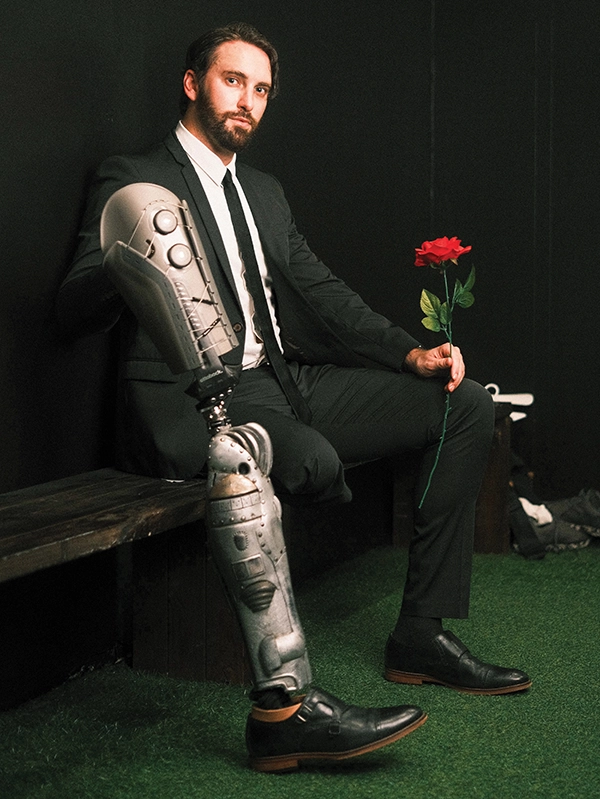
I learned about my disability, lymphedema, when I was 11 years old. Lymphedema affects the lymphatic system, which is responsible for moving lymph (a fluid that aids your immune system) throughout the body. Although lymphedema impacts an estimated 10 million Americans, most people have never even heard of it. And I had the rarest form of the disease, primary (or congenital) lymphedema, which only affects about one in 100,000 children. (Secondary, or acquired, lymphedema, is less uncommon.) I was seen by a dozen specialists who tested me for bone diseases, cancer, and all sorts of other medical conditions before they were finally able to make the diagnosis.
The news had a profound impact on my sense of identity. Like a lot of boys at that age, I dreamed of becoming a professional athlete (a basketball player, in my case). But my doctors, physical therapists, and coaches told me I would never play basketball even at the high school level, much less in the pros, because of my condition. When you have your dreams shattered before you even become a teenager, you really start to question what your purpose in life is.
Another unfortunate reality of lymphedema is that it’s a progressive disease that has no cure. Whether you were born with lymphedema or acquired it later in life, lymphedema causes ongoing recurrences of infection. The typical infection for a person living with lymphedema is cellulitis, which affects the skin and is treatable with antibiotics. But many people develop other serious infections, such as osteomyelitis. This type of infection attacks the bones and often brings high fever, severe swelling, and debilitating pain that makes mobility all but impossible. It can attack suddenly and may require immediate treatment with IV antibiotics. Unfortunately, I was prone to these harsher types of infections.
I never intended for my disability to become a subject for public consumption when I auditioned for The Bachelorette. It wasn’t even my idea to go on the show. A friend of mine had the brilliant idea to nominate me in March 2019, after I’d had a devastating breakup with a serious girlfriend. Despite my hesitation, I decided to go through with the process, thinking there was no possible way I would get cast. When I did get selected as a contestant a couple of months later, I still had no idea that it would completely change my life—and not in a good way.
I will spare you all the details of that relatively short journey to find love. Here’s what it came down to: When I opened up about my very private, personal experience with lymphedema, including the fact that it might someday cause me to lose a leg, it was depicted as a manipulative appeal for sympathy. Making yourself vulnerable is never easy, much less doing it in front of millions of strangers. But I was not expecting to have my lifelong health struggles dismissed as a contrived attempt to draw attention to myself.
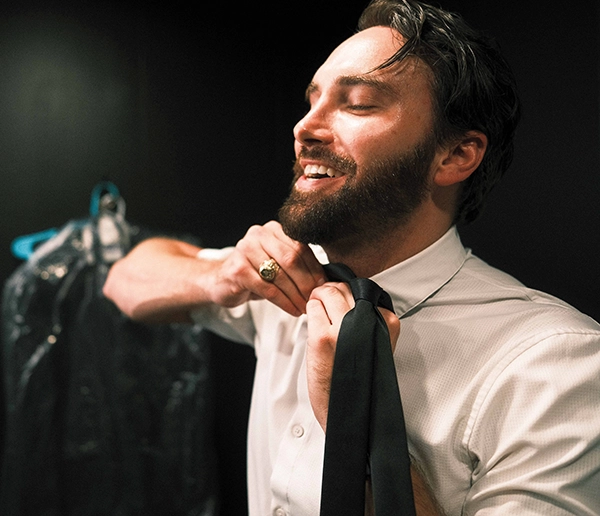
It was one of the most difficult seasons of life that I’ve ever had to navigate. Fortunately, I was blessed to have an amazing family, friends, church, community, and fellow lymphedema advocates who were constantly in my corner. Yet even with that support system, I still felt incredibly depressed and alone, because nobody in my circle had ever experienced that type of shaming on such a large stage. They couldn’t fully understand what I was going through, nor offer useful advice for how to get out of the rut that I was in.
Some may consider me to be a glutton for pain and torture, because—clinging to the promise of redemption—I agreed to become a contestant on the spinoff series Bachelor in Paradise later that year. It did not even cross my mind that the network would double down on my persona as a desperate schemer, serving up an even worse edit. That experience made my pit of depression feel deeper than the lowest valleys in the Grand Canyon. I started believing that the way I was portrayed on TV was my true identity.
WHEN YOU ARE LIVING WITH a disability—whether it’s lymphedema, limb loss, or anything else—it can feel like running in quicksand. The harder you fight to maintain your happiness and your sense of self, the faster you seem to sink into the depths.
By my early 30s, I had endured 16 emergency surgeries on my right knee due to infection. I also had ongoing battles with osteomyelitis, including nine separate episodes of it between 2014 and 2021. The constant cycle of surgery, recovery, pain management, and other disruptions impacted my career, my physique, and every other aspect of my life. As you can imagine, it also had a catastrophic effect on my romantic relationships. Several of them didn’t work out because of the persistent infections in my right leg.
By 2022, three years after my Bachelorette disaster, I was down to two options: revise the total knee replacement that I had already endured, or amputate above the knee. I will be completely honest with you: It was a relatively easy decision to make. After 24 years of chronic pain, surgeries, and failed relationships, combined with everything I had just gone through on The Bachelorette, I literally felt I had nothing left to lose. And when I started educating myself about limb loss, I started to feel some glimmers of optimism.
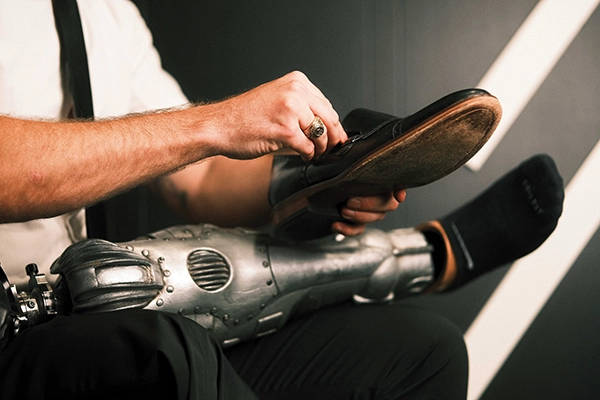
I had two months to prepare for my amputation, so I started reaching out to amputees I discovered on Instagram. The first six people that I connected with were super responsive, insightful, honest, and encouraging. Each had a different experience, but there were some common denominators that helped alleviate my anxiety. I now saw real potential that my life would become better after amputation.
The day after my surgery, I was shocked to find that many of the same popular media platforms (including People and Entertainment Tonight) that had dragged me through the mud over The Bachelorette were suddenly telling a very different, more generous narrative about me. It’s not that I needed their vindication or validation, but I was grateful for the coverage because it gave me a platform to spread awareness about limb loss and limb difference. I viewed this not as an obligation but rather as an honor, an opportunity to give back to the community that was there for me before I was even officially an amputee. I thought that if I could improve even one individual’s experience or make it easier for their loved ones, then my years of suffering would not be in vain.
Losing my leg gave me a new sense of purpose. I projected strength and self-confidence in my social media feed and at nonprofit events that I attended as a limb-loss advocate and ambassador. But privately, I continued to struggle with my identity. Like many new amputees I experienced body dysmorphia, feeling extremely self-conscious about my physical appearance. This heightened my fear that I was unworthy of receiving love, something that has haunted me ever since my lymphedema diagnosis. My family and friends did their best to support me, but their lack of knowledge about limb loss kept them from giving me the empathy that I desperately needed. It was not until I attended a Challenged Athletes Foundation weekend, where I shed tears with other amputees, that I actually began to move toward the self-acceptance that had escaped me for so many years.
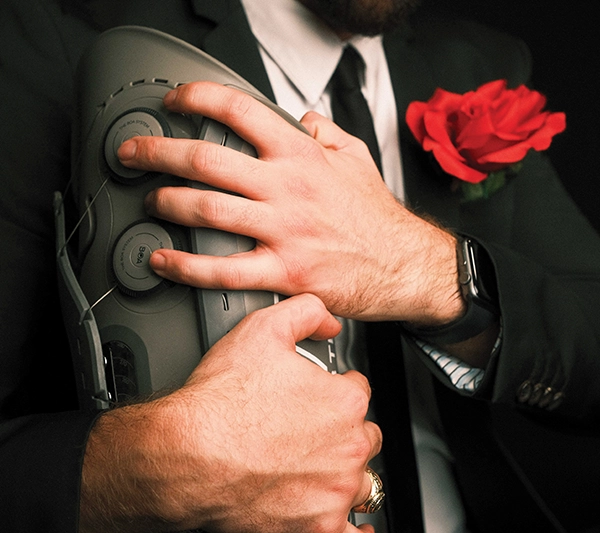
There are no linear pathways or timelines to grief. But here are three tips that have gotten me through my journey to self-love as a lymphedema patient and amputee.
LEVITY CAN ELEVATE YOU: I have always used humor as a coping mechanism, not necessarily to mask pain or trauma but to navigate through it. Charlie Chaplin, the iconic comedian, used to say: “A day without laughter is a wasted day.” I do not want to make light of anyone’s personal journey, but I have always found it extremely helpful to create moments where I can smile, even on my darkest days—and the reality is that we are all going to have dark days, whether or not we have a disability. You may discover, as I have, that laughter can overpower your tears.
SELF-HELP BEGINS WITH HELPING OTHERS: Four months after my amputation, I decided to volunteer on a humanitarian effort to bring prosthetic supplies to war-torn Ukraine. My parents thought I was absolutely nuts, and maybe I was. But doing a hard thing on behalf of other people heightened my sense of courage about the future. The same thing happened last October when I joined the Range of Motion Project (ROMP) on their annual fundraising climb in Ecuador. Our team, consisting of 15 individuals with limb loss or limb difference, climbed 19,000-foot Mount Cayambe to support ROMP’s prosthetic clinics in some of the Western Hemisphere’s poorest communities. It was by far the most difficult physical and emotional voyage I have ever taken, but incredible healing and lifelong friendships emerged from taking that risk.
You don’t have to climb a literal mountain or go into a war zone to achieve this type of payoff. I have found that any time I volunteer or offer support to people who need it, I receive far more in return than what I give. By taking action to help others, I’ve grown better able to love myself.
YOU ARE COMPLETE: When I was recovering from my amputation, I tried mirror therapy to alleviate my phantom limb pain. In case you’re not familiar with that modality, it uses strategically placed mirrors to create the illusion of wholeness, where the reflection of your remaining limb tricks your brain into perceiving that your amputated limb is still there.
I want to talk about another kind of mirror therapy—one that involves removing illusions, not creating them. In this approach, you look at yourself in the mirror, face to face, and say “I am complete” out loud three times. I understand that saying it is considerably less difficult than actually believing it. The part of my self-love journey that has required the most work is to truly believe in myself as a whole person. Even though I have lost a leg, I am no less of a man, no less of a son, no less of a friend, no less of an athlete, and no less of a future spouse.
You are not your amputation, you are not your limb difference, you are not your disability. Those are illusions that are created by a society that does not understand limb difference and does not understand disability. They’re as false as the narrative about me on The Bachelorette that was created by editors who didn’t understand lymphedema. Don’t fall for the illusion. See the truth: You are complete, you are worthy of giving love, and you are worthy of receiving love.


